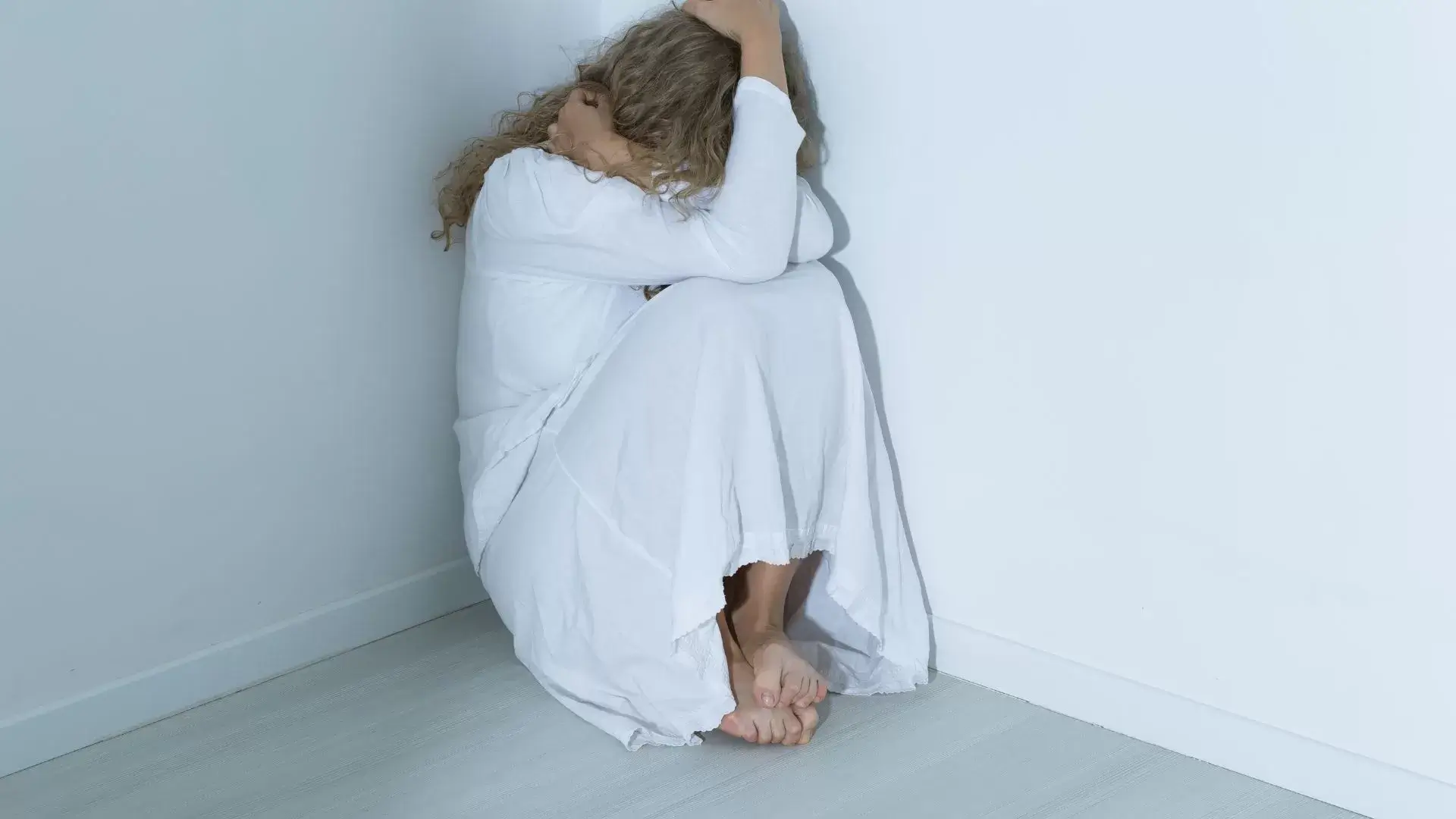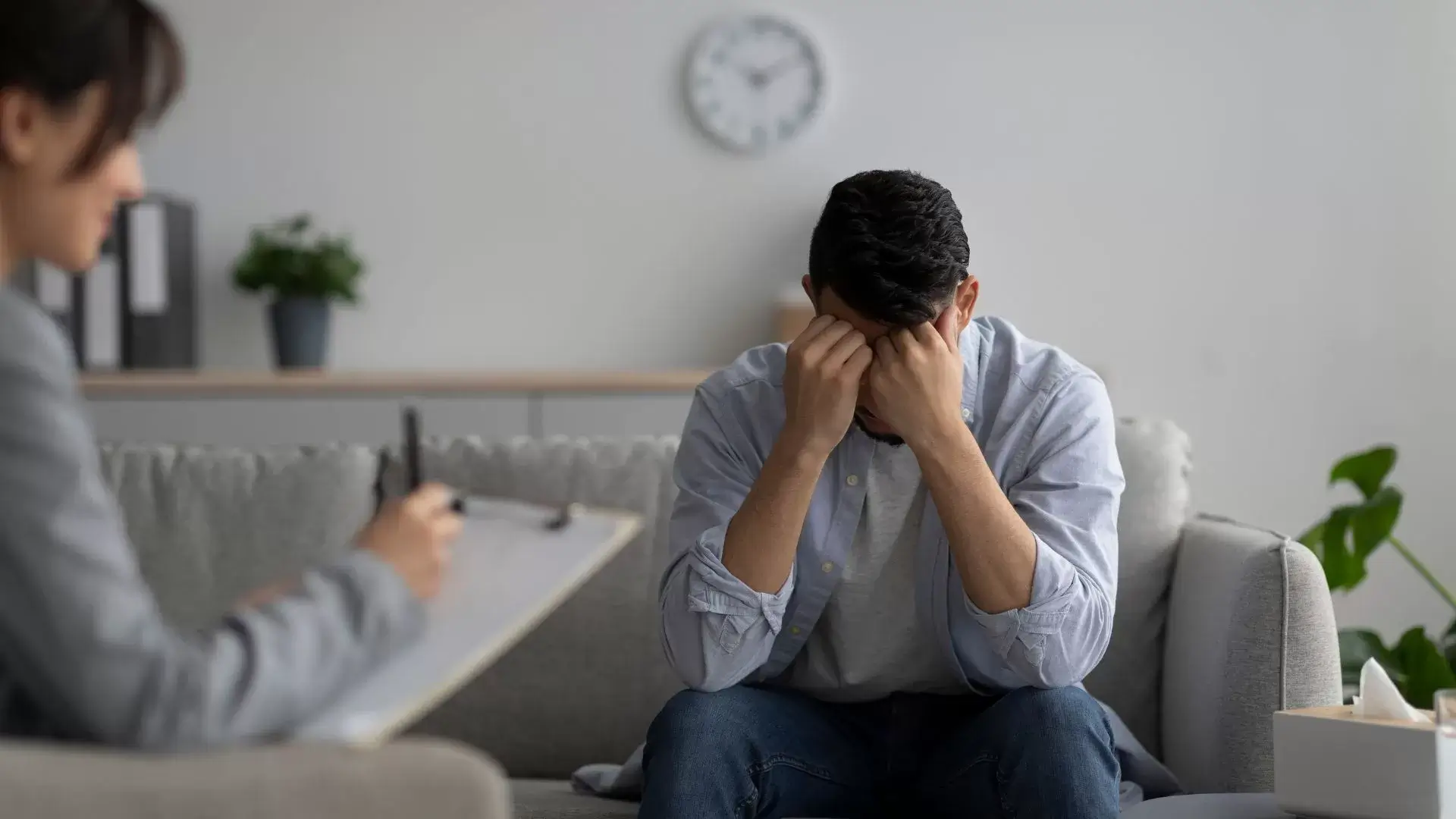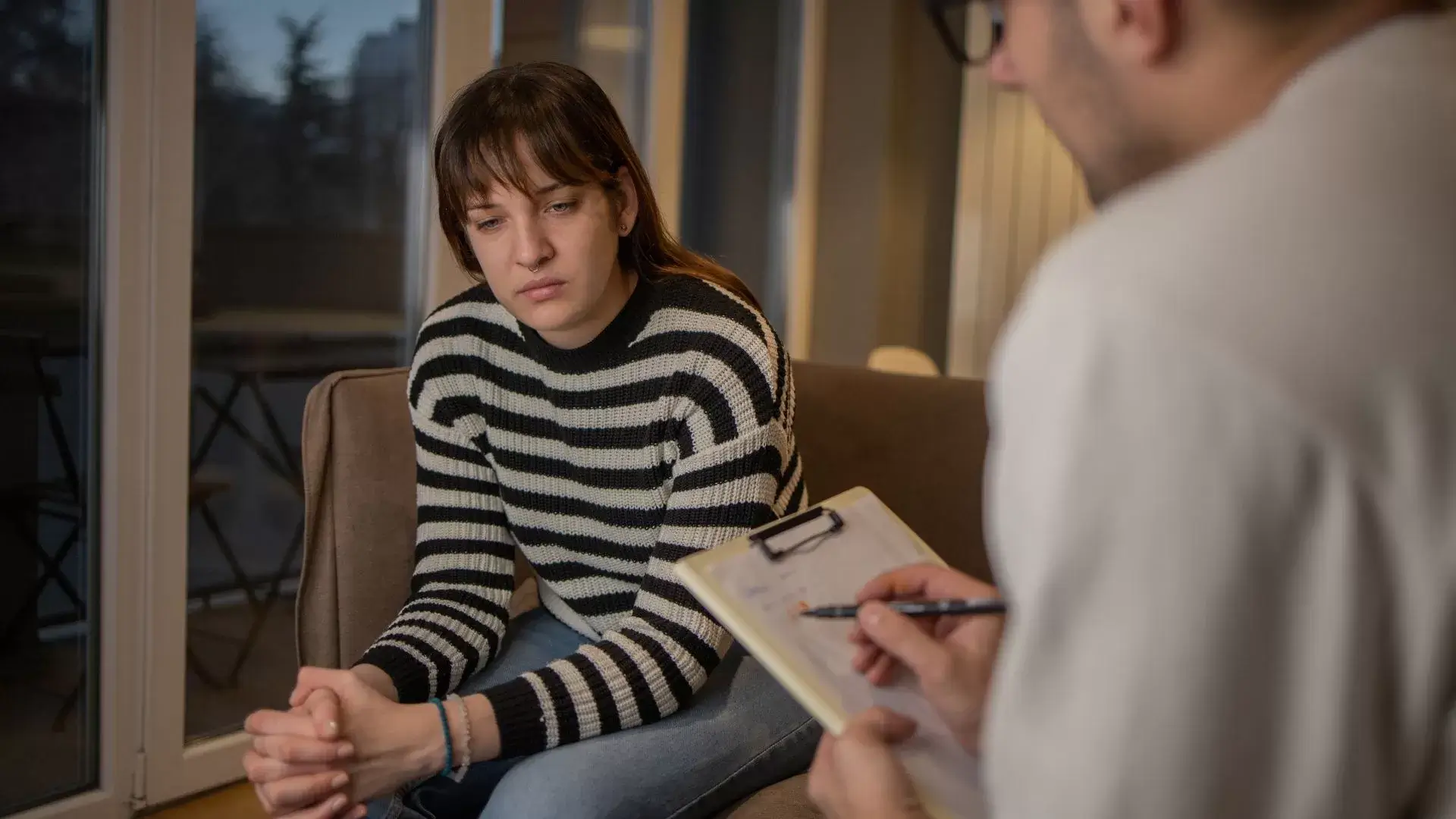Anxiety Disorder Psychotherapy
We recognize that dealing with anxiety disorders can be incredibly challenging, but psychotherapy offers a supportive path toward healing. Our tailored counseling services address various anxiety types, such as Generalized Anxiety Disorder or PTSD, using evidence-based approaches like Cognitive Behavioral Therapy and mindfulness techniques.
These therapies empower us to confront fears, identify negative thought patterns, and develop healthier coping strategies. It’s important to remember you’re not alone in this journey. Together, we can explore how therapy can improve your emotional well-being and resilience against anxiety. There’s so much more we can share to support you on this path.

About Our Psychotherapy Counseling Services
At Psychotherapy Counsellors Center, we recognize the unique challenges that anxiety disorders present, and we’re here to offer compassionate psychotherapy services tailored to your needs. Our goal is to create a supportive environment where you can explore your feelings and learn effective coping strategies. We acknowledge that anxiety can be overwhelming, so we emphasize a personalized anxiety management plan that addresses your specific concerns.
Our psychotherapy counseling services include evidence-based anxiety treatment options, such as cognitive behavioral therapy (CBT), which focuses on changing negative thought patterns and behaviors. We also incorporate relaxation techniques to help you regain a sense of calm and control in your life. Through anxiety therapy, we aim to enhance your emotional regulation skills, enabling you to respond to stressors more effectively.
Additionally, we provide valuable anxiety resources to empower you on your journey toward improved mental health. Our experienced therapists are committed to guiding you through each step of the process, ensuring you feel heard and acknowledged. Together, we can work towards a brighter, more balanced future free from the constraints of anxiety.
Understanding Anxiety Disorders: Types and Symptoms
Anxiety Disorders encompass a variety of conditions that can greatly impact our daily lives, each with its own set of symptoms and challenges. For instance, generalized anxiety disorder often leaves us feeling overwhelmed by chronic worry, impacting our ability to function. Panic disorder can introduce sudden, intense fear, leading to physical symptoms of anxiety, such as rapid heartbeat or shortness of breath.
Social anxiety can make everyday interactions feel intimidating, causing us to avoid situations that trigger our fears. Similarly, obsessive-compulsive disorder compels us to engage in repetitive behaviors or rituals in response to intrusive thoughts. Post-traumatic stress disorder can arise after experiencing or witnessing traumatic events, resulting in severe anxiety symptoms that disrupt our sense of safety.
Understanding these anxiety triggers is essential for an accurate anxiety diagnosis. By recognizing the specific types of anxiety disorders we may be facing, we can seek the appropriate support and treatment. It’s important to remember that we’re not alone in facing these challenges, and with empathy and understanding, we can work towards managing our anxiety and improving our quality of life.
Common Anxiety Symptoms and How They Affect Daily Life
Living with anxiety can manifest in various symptoms that greatly impact our daily routines and overall well-being. We often experience common anxiety symptoms like nervousness, which can lead to feelings of unease in social situations or during important tasks. This nervousness sometimes escalates into anxiety attacks or panic attacks, causing physical reactions like shortness of breath and a rapid heartbeat.
Muscle tension is another frequent symptom, making it difficult for us to relax, and can even contribute to chronic pain. Sleep disturbances, such as insomnia or restless nights, can further exacerbate our anxiety, leaving us feeling exhausted and overwhelmed.
It’s vital for us to recognize these symptoms and understand how they affect our lives. By implementing effective stress management techniques and developing anxiety coping skills, we can start to regain control. Whether it’s through mindfulness practices, deep breathing exercises, or seeking support from friends and professionals, we can find ways to navigate our daily challenges. Together, we can learn to manage these symptoms, fostering a sense of empowerment and enhancing our overall quality of life.
Generalized Anxiety Disorder (GAD): Treatment and Support
Finding effective treatment and support for Generalized Anxiety Disorder (GAD) can feel overwhelming, but understanding the available options helps us take meaningful steps toward relief and healing. We realize that coping strategies are essential in managing GAD, and we can explore various approaches together.
Mindfulness for anxiety is one powerful tool that allows us to focus on the present moment, reducing overwhelming thoughts. Additionally, self-help for anxiety can empower us, offering practical techniques we can use daily. Some of us may benefit from anxiety medications that our healthcare provider can prescribe to help alleviate symptoms.
For those seeking structured support, exposure therapy can gradually help us confront our fears, building emotional resilience over time. Joining anxiety support groups can also provide a sense of community, reminding us we’re not alone in this journey.
While CBT for anxiety is vital, we should also consider complementary practices like mindfulness and exposure therapy. By combining these methods, we can find the right mix of treatments that works best for us. Together, we can navigate this path toward healing and improved mental well-being.

Cognitive Behavioral Therapy (CBT) for Anxiety
Cognitive Behavioral Therapy (CBT) can be a transformative approach for those of us seeking to understand and manage our anxiety more effectively. This evidence-based psychotherapy for anxiety focuses on identifying and challenging our excessive fear and irrational thoughts that often fuel our anticipatory anxiety. Through CBT, we learn to recognize our avoidance behaviors and intrusive thoughts, which can hold us back from emotional healing.
In our sessions, we’re guided to confront these fears gradually, allowing us to experience anxiety relief in a structured way. By utilizing techniques like relaxation therapy, we can equip ourselves with tools to cope with anxiety in real-time. CBT emphasizes that our thoughts influence our feelings and behaviors, giving us the power to reshape our responses to anxiety-provoking situations.
As we engage in this therapeutic process, we become more aware of how our thought patterns contribute to our anxiety. This awareness is essential for breaking the cycle of distress and fostering resilience. Ultimately, CBT helps us build healthier coping strategies, enabling us to manage our anxiety and reclaim our lives. Together, we can navigate this journey toward greater understanding and peace.
Mindfulness-Based Therapy for Anxiety Management
Mindfulness-Based Therapy offers us a powerful way to manage anxiety by encouraging present-moment awareness and acceptance of our thoughts and feelings without judgment. This approach helps us cultivate mindfulness, which can greatly aid in anxiety management. By practicing breathing exercises and meditation for anxiety, we can train our minds to focus on the here and now, reducing stress and promoting emotional well-being.
Incorporating mindfulness into our daily routine serves as a form of anxiety self-care, allowing us to respond to our anxious thoughts with compassion instead of fear. This holistic anxiety treatment emphasizes not just alleviating symptoms but fostering a deeper understanding of our mental health. As we engage in mindfulness practices, we’re better equipped to navigate our feelings, paving the way for anxiety recovery.
Through mental health awareness, we can break the stigma surrounding anxiety and recognize that overcoming anxiety is a journey best taken together. By embracing mindfulness-based therapy, we discover tools for stress reduction and a renewed sense of calm. Ultimately, we empower ourselves to face life’s challenges with resilience and clarity, transforming our relationship with anxiety.
Panic Disorder and Effective Treatment Approaches
Panic disorder can feel overwhelming, but understanding effective treatment approaches can empower us to reclaim our lives and navigate our fears with confidence. Many of us have experienced the debilitating effects of panic attacks, which can lead to hypervigilance and avoidance behaviors, especially in situations like public speaking.
Fortunately, several effective treatments are available. Selective serotonin reuptake inhibitors (SSRIs) are often prescribed to help manage symptoms, while benzodiazepines can provide quick relief during acute episodes. However, it’s crucial to consult with a healthcare professional to find the right balance.
In addition to medication, we can implement lifestyle changes for anxiety that promote overall well-being. Regular exercise, a balanced diet, and mindfulness practices can greatly reduce anxiety in teens and adults alike. Building confidence through gradual exposure to feared situations can also help us face our challenges head-on, minimizing the fear of public speaking or other triggers.
Social Anxiety: Overcoming Fear of Social Situations
Many of us struggle with social anxiety, feeling overwhelmed in everyday situations like meeting new people or attending gatherings, but there are effective strategies we can use to overcome these fears. It’s important to recognize that social phobia often stems from a fear of failure or rejection, leading to performance anxiety in various settings.
By acknowledging our feelings and reframing our thoughts, we can challenge catastrophic thinking that magnifies our fears. For example, instead of assuming everyone will judge us negatively, we might consider that others are likely focused on their own concerns.
For anxiety in children, fostering a supportive environment can help them navigate their feelings of separation anxiety and build confidence. Practicing relaxation techniques can alleviate insomnia and fatigue, making it easier to face social situations.
We’re not alone in this struggle; many feel the weight of social anxiety, especially those with a history of trauma or PTSD. By taking small steps—like initiating conversations or joining community activities—we can gradually lessen our fears and create more fulfilling social experiences. Together, we can work towards a brighter, more connected future.
Post-Traumatic Stress Disorder (PTSD) and Trauma Therapy
Post-Traumatic Stress Disorder (PTSD) can deeply affect our lives, but with the right trauma therapy, we can begin to heal and reclaim a sense of safety and normalcy. Many of us experience symptoms such as anxiety and depression, chest tightness, and an overwhelming flight-or-fight response that keeps us trapped in fear. It’s essential to acknowledge these feelings and seek help.
At our therapy center, we provide a supportive environment to address the underlying trauma. We recognize that fear of abandonment can exacerbate our struggles, making it harder to form connections. By working together, we can explore the impact of traumatic events on our lives, including how they may trigger phobias or obsessive-compulsive disorder (OCD).
Trauma therapy often incorporates SSRIs, which can help manage symptoms, allowing us to focus on healing. As we navigate this journey, we’ll cultivate coping strategies that empower us to face our fears and reclaim our lives. If you’re feeling overwhelmed, don’t hesitate to reach out to us. Together, we can take the first step towards recovery.
Managing Separation Anxiety and Phobias
As we explore the impact of trauma on our lives, it’s crucial to recognize how it can lead to challenges like separation anxiety and phobias, affecting our relationships and daily functioning. Many of us may find ourselves experiencing intense fear or distress when faced with separation from loved ones or certain situations.
To manage these feelings, we can start by identifying the triggers that provoke our anxiety. It’s imperative to approach this process with kindness towards ourselves, acknowledging that these feelings are valid. Gradual exposure to the feared situation, in a safe and controlled way, can help us build resilience over time.
Moreover, practicing relaxation techniques, such as deep breathing or mindfulness, can ground us during moments of panic. It’s also beneficial to communicate openly with those around us, sharing our experiences so that they can provide support.
Ultimately, we’re not alone in this journey. Seeking professional help can also be a crucial step in understanding and addressing our separation anxiety and phobias, allowing us to reclaim our lives and foster healthier connections. Together, we can navigate these challenges and find a path towards healing.

The Role of Medication in Anxiety Treatment
Medication can play an essential role in our journey toward managing anxiety, providing relief that allows us to engage more fully in therapy and daily life. For many of us, the symptoms of anxiety can be overwhelming, making it difficult to focus on the therapeutic work we need to do. This is where medication can step in as a valuable tool.
Antidepressants, particularly selective serotonin reuptake inhibitors (SSRIs), and anti-anxiety medications can help stabilize our mood and reduce feelings of panic. They’re not a one-size-fits-all solution, and it’s important for us to work closely with our healthcare providers to find the right medication and dosage.
We should remember that medication is most effective when combined with psychotherapy. While it helps alleviate symptoms, therapy addresses the underlying issues and equips us with coping strategies. It’s also vital to monitor our progress and communicate openly with our doctors about any side effects or concerns.
Ultimately, embracing medication as part of our treatment plan can be an empowering step, enabling us to reclaim our lives and work towards long-term healing. We’re not alone in this journey, and support is always available.
Relaxation Techniques and Breathing Exercises for Stress Relief
Incorporating relaxation techniques and breathing exercises into our daily routine can markedly help us manage stress and anxiety more effectively. These practices aren’t just for moments of crisis; they’re tools we can use to cultivate calmness and resilience in our everyday lives.
One simple yet powerful technique is deep breathing. By taking slow, deep breaths, we activate our body’s relaxation response. We can try inhaling through our noses for a count of four, holding for four, and then exhaling through our mouths for another count of four. This technique can ground us and help reduce feelings of panic.
Progressive muscle relaxation is another effective method. By systematically tensing and then relaxing each muscle group, we can release stored tension and promote a sense of peace.
Mindfulness meditation, even for just a few minutes each day, can also aid in centering our thoughts and emotions. It allows us to observe our feelings without judgment, helping us to gain perspective.
Anxiety in Children and Teens: Specialized Psychotherapy
Understanding anxiety in children and teens requires specialized psychotherapy that addresses their unique emotional and developmental needs, allowing us to support them effectively on their journey to mental well-being. It’s vital to recognize that young individuals often experience anxiety differently than adults. They might struggle to articulate their feelings or understand what they’re going through, which is why tailored therapeutic approaches are essential.
In our practice, we focus on creating a safe and nurturing environment where children and teens can express themselves freely. Techniques like cognitive-behavioral therapy (CBT) have proven effective, helping them identify negative thought patterns and replace them with healthier perspectives. Additionally, incorporating play therapy or art therapy can be particularly beneficial, as these methods allow for expression in a non-verbal manner.
We’re also mindful of involving parents or guardians in the process, as their support can greatly enhance the effectiveness of treatment. By working together, we can empower young individuals to develop coping strategies, build resilience, and ultimately thrive. It’s our shared goal to help them navigate their challenges and foster a brighter, anxiety-free future.
Holistic Anxiety Treatment: Integrating Mind and Body Wellness
Many people find that integrating mind and body wellness techniques can profoundly enhance their journey toward overcoming anxiety. By adopting a holistic approach, we can address not just the symptoms of anxiety but also its root causes. This means recognizing the connection between our mental and physical states and understanding how they influence one another.
Practices like mindfulness meditation and yoga can help us cultivate a sense of calm, grounding us in the present moment. As we engage in these activities, we often notice a reduction in racing thoughts and an increase in emotional resilience. Additionally, incorporating regular physical activity into our routines can boost mood-enhancing endorphins, providing a natural way to alleviate anxiety.
Nutrition also plays an essential role; what we eat can impact our mental health. By choosing balanced, nutrient-rich foods, we nourish our bodies and minds simultaneously.
Ultimately, embracing a holistic approach allows us to develop a thorough strategy for managing anxiety. It’s about creating a lifestyle that supports our overall well-being, helping us feel more balanced and empowered as we navigate our challenges. Together, we can foster a nurturing environment for healing and growth.
Building Confidence and Emotional Healing Through Therapy
Therapy can be a transformative journey for us, offering a safe space to rebuild confidence and foster emotional healing in the face of anxiety. As we navigate our individual experiences, we often discover that sharing our feelings with a trained professional helps us feel validated and understood. This connection lays the groundwork for us to explore our fears and insecurities without judgment.
Through various therapeutic techniques, we can learn to challenge negative thoughts and replace them with more positive, realistic perspectives. We’re encouraged to set achievable goals, which can empower us and gradually restore our self-esteem. Each small success we achieve in therapy serves as a stepping stone toward greater confidence.
Moreover, therapy provides us with valuable tools to manage our emotions effectively. We can learn coping strategies that not only help us during anxiety episodes but also promote overall emotional resilience. As we progress, we start to see ourselves in a new light, embracing our strengths and acknowledging our journey.
Ultimately, therapy equips us with the skills needed to heal emotionally and build a more confident self, paving the way for a brighter, more fulfilling future.
Reach Out for Professional Anxiety Disorder Psychotherapy Services
Seeking professional anxiety disorder psychotherapy services can be an important step in our journey towards healing and resilience. When we decide to reach out for help, we’re not just acknowledging our struggles; we’re also empowering ourselves to find effective coping strategies and support. Therapy provides a safe space for us to explore our feelings, understand our triggers, and develop healthier thought patterns.
It’s important to remember that we’re not alone in this. Many qualified professionals specialize in anxiety disorders, offering tailored approaches that can meet our unique needs. By engaging in therapy, we can gain insights that lead to improved emotional well-being and a more fulfilling life.
We might feel hesitant or uncertain about taking this step, but it’s vital to recognize the strength it takes to seek help. Together, we can create a support system that helps us navigate through our challenges. Let’s take the leap into therapy, armed with the knowledge that it’s okay to ask for support. As we begin on this journey, we’ll find that reaching out for professional help can be a transformative experience, guiding us toward a brighter, more resilient future.
Frequently Asked Questions
How Do I Know if I Need Anxiety Psychotherapy?
We often find ourselves questioning whether we need help, especially when stress feels overwhelming. If we’re feeling persistently anxious, struggling to manage daily tasks, or noticing physical symptoms like racing hearts, it might be time to seek support. It’s important to remember that we’re not alone; many people face similar challenges. Trusting our feelings and reaching out for guidance is a brave step toward understanding ourselves better and improving our well-being.
What Should I Expect During My First Therapy Session?
When we attend our first therapy session, we can expect a warm and welcoming environment. Our therapist will likely ask us about our concerns and goals, allowing us to share at our own pace. It’s normal to feel nervous, but remember, they’re there to support us. We might also engage in some initial assessments to help guide our journey. Overall, it’s a safe space for us to explore and begin our healing process.
Are There Any Side Effects of Anxiety Psychotherapy?
When we’re considering the side effects of psychotherapy, it’s vital to remember that everyone’s experience is unique. Some of us might feel emotional discomfort as we explore difficult topics, while others may find it challenging to confront certain feelings. However, these reactions usually indicate progress. It’s crucial to communicate openly with our therapist about any concerns we have, as they’re there to support us through the journey and help us navigate these feelings.
How Long Does Anxiety Therapy Typically Last?
When we think about how long therapy typically lasts, it really varies for each of us. Generally, we might spend anywhere from a few weeks to several months in therapy, depending on our individual needs and goals. Some may find relief relatively quickly, while others might benefit from longer engagement. It’s important for us to communicate openly with our therapist about our progress and any concerns we have along the way.
Can I Use Therapy Alongside Medication for Anxiety?
Absolutely, we can use therapy alongside medication for anxiety. In fact, many people find that combining both approaches enhances their overall well-being. While medication can help manage symptoms, therapy offers us tools and strategies for coping and understanding our feelings better. It’s crucial to communicate with our healthcare providers about our treatment plans, ensuring we get the most effective support tailored to our specific needs. Together, we can navigate this journey towards healing.


